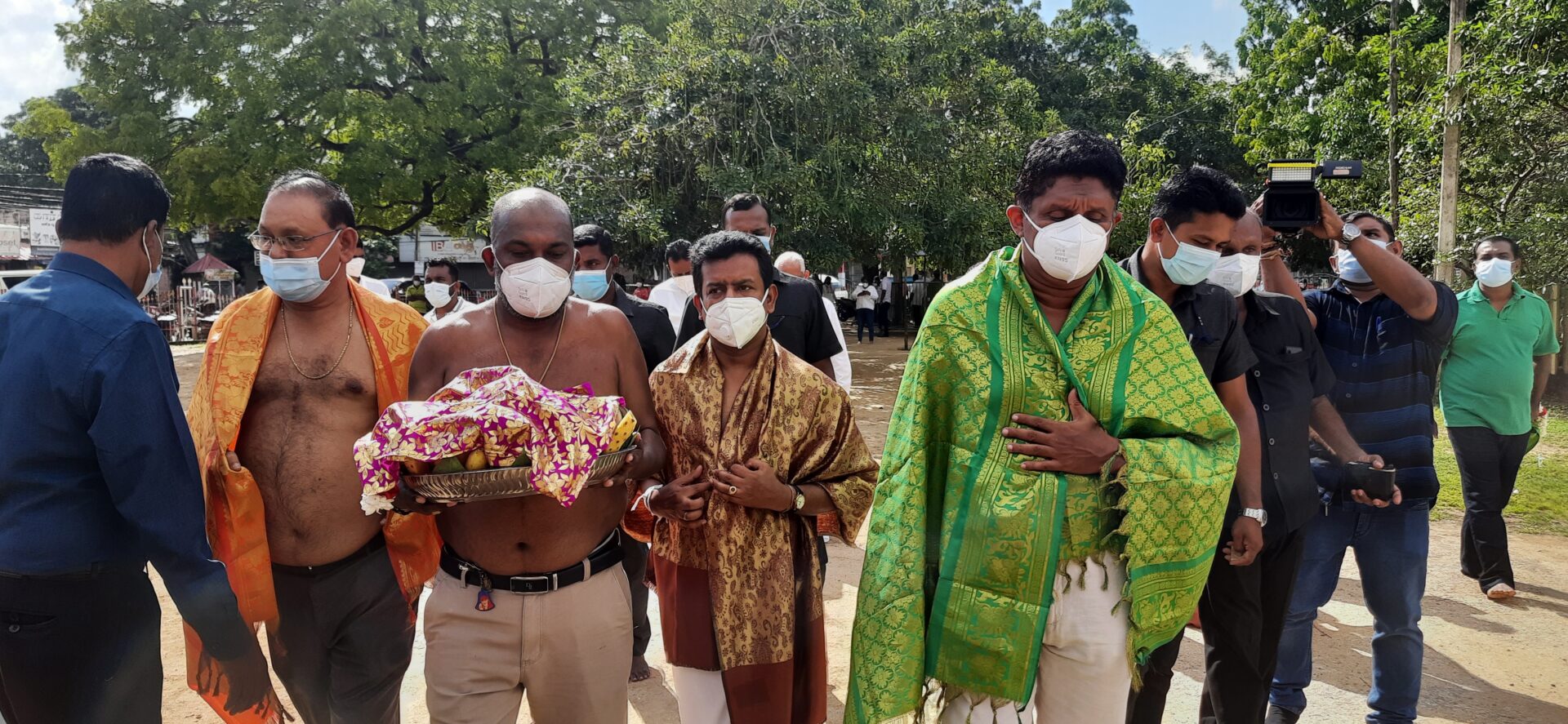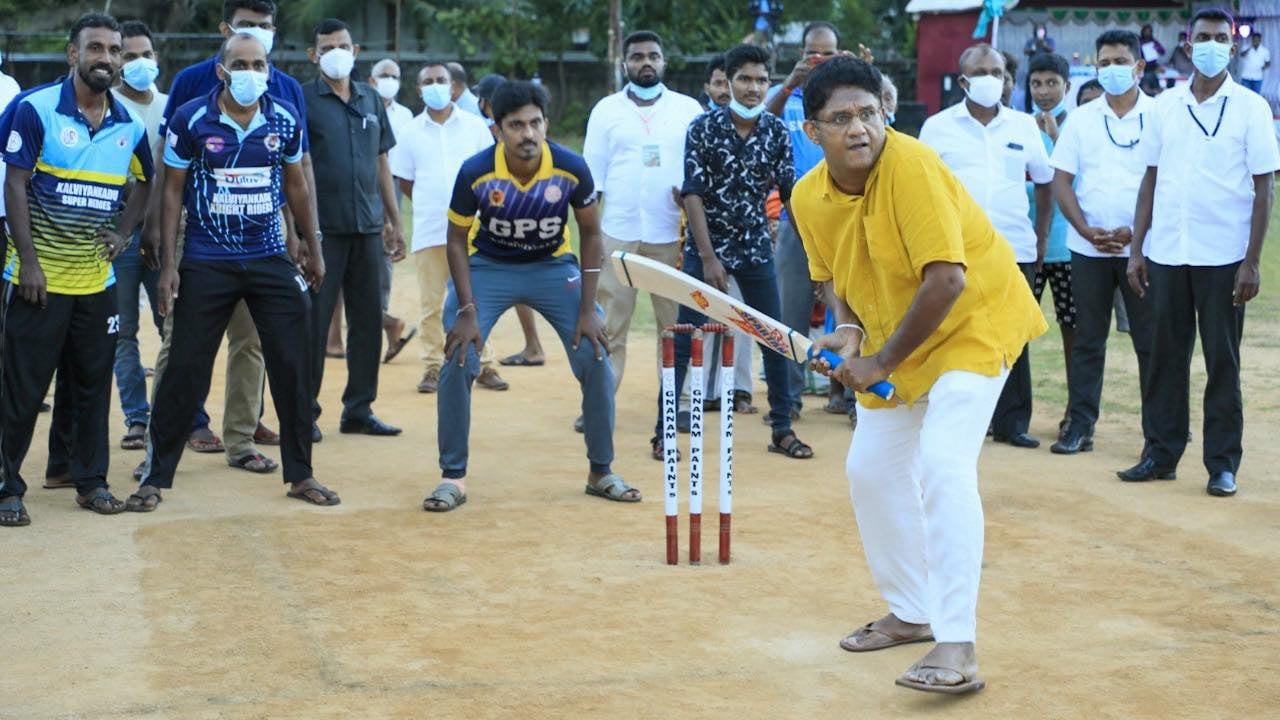by Nillanthan in his blog, January 16, 2022
[translated from the Tamil by Google Translate with some edits]

Sajit Premadasa had arranged a meeting in Jaffna last Tuesday. The meeting was organized by the National Organization for Professionals and the Intellectuals Forum in support of the United People’s Power Alliance. Scholars from the University of Peradeniya, members of the Intellectuals Forum, participated in a dinner hosted at the Dilco Resort in Jaffna. Their friends, scholars from the Department of Political Science, University of Jaffna, also took part.
Sajit Premadasa was the first to address the current economic crisis. Sajit introduced the 13th Amendment when one of the assembled people asked what the United People’s Power’s solution to the ethnic problem was. A scholar from the Department of Political Science at the University of Jaffna has pointed out that the 13th Amendment has failed. Over 13 Tamil people have put on the table proposals for a federal-like solution. Sajit pointed out that distrust between races was the cause of the problems and that it was right to build that trust. He emphasized that the solution to the ethnic problem was to build inter-ethnic harmony. One of the participants in the meeting said that if he had compiled his comments on the 13th Amendment in the course of the conversation, he would have presented it as a way of resolving economic issues relevant to all parts of the country.
Ranawaka had come to the north a few weeks before this. He told a tea party in Kilinochchi that the word ‘federal’ could cause fear among the Sinhalese people. But he also said he would accept a federal solution. He has made a tonal comment that a solution can be given to the Tamil people without giving the title ‘federal.’
Udaya Kamanpila had arrived in Jaffna a few weeks before his arrival.
Sajit Premadasa, Udaya Kamanpila, Champika Ranawaka and Anurakumara Dissanayake are seen as potential opposition figures against Rajapaksa. But their solutions to the ethnic problem show us that they have no blueprint for a three-party mandate against Rajapaksa. They cannot downplay Sinhala-Buddhist nationalism while providing a solution to the Tamil people. They are not ready to go down and work among the Sinhala electorate for that. So it is doubtful whether they can stand up against the Rajapaksas.
The Rajapaksas are beginning to think about becoming president next time. Note here a comment made by the President a few days ago… “I have been requested by the public to get through the referendum the two years I lost to Covid …… The idea was put forward by a young man from Kandy.” “I was talking to people when I went to the Kandy headquarters for worship. Then a young man volunteered and said, “If you have lost, you have lost two years. Why can’t you get it through a referendum?”
That is, is Gotabhaya preparing to put the blame on the virus for the crises the country is now facing and regain power? His opponents suspect that. It is speculated in the South that he could extend his term by holding a referendum, as Jayewardene did.
Do the Rajapaksas expect the people to forget all the hardships they have endured if the country overcomes the current economic crisis for a while and then gets help from China to revive the economy? On that basis an explanation is also put forward by a section of critics that they may have a plan for something towards the next election. Sri Lanka’s economy is very small. If a big country like China could help, the island of Sri Lanka could easily recover from the economic crisis. It is therefore speculated that Gotabhaya Rajapaksa will keep an eye on his next term as well.
In such a political environment, the opposition needs to mobilize more vigorously. But a summary of reports from South Sri Lankan leaders who have visited the north in recent weeks shows that the majority of opposition leaders do not have the populist population of all three races. All Sinhala leaders who are unwilling to take a risk and work among the Sinhalese people to come up with a bold solution to the ethnic problem are in some way defending Sinhala-Buddhist nationalism. If their political goal is to defend Sinhala-Buddhist nationalism, it will be difficult for them to confront the Rajapaksas.
This is because the war victory argument is the post-2009 development of Sinhala-Buddhist nationalism. With the 2018 Easter bombing it has also updated itself to the next level of being anti-Muslim. So a leader is needed to win the votes of relatively three ethnic groups in order to confront war victory. It cannot be achieved by individual Sinhala votes. Sajith and Udaya Kamanpila and Chambika Ranawaka are coming to the North because they understand it well. Beyond the slippery slope Ranil Wickremesinghe appeared as such a leader in 2015. But he also defeated the transitional justice of the child he had just given birth to.

Now Sajit Premadasa and Udaya Kamanpila and Ranawaka are coming to the North East targeting Tamil voters. It looks like they are going to play an election drama again. The tactics he used to impress the Tamil people during Sajith’s visit to the north were already the tactics used by Angajan during the last general election. The villagers were called over the loudspeaker to attend the meeting in Vadamarachchi. It has been confirmed that a Pongal package will be delivered during the call. Similarly, in some villages, men’s shirts have been provided to households. Sajit Premadasa who came with the Pongal package did not come with the solution package for the ethnic issue. Does he believe that he can attract the Tamil people by showing the Pongal package? To date he has not proven that he has loyal and courageous plans to resolve the ethnic issue.
Some western countries may believe that by projecting someone like him, Tamil, Sinhala, Muslim and upcountry votes can bring about a regime change. But what the Tamil people need is not regime change. What is needed now against the Rajapaksas is a Sinhala leader who has the courage to accept the existence of the four national races of Sri Lanka and promise a federal structure. The regime change of 2015, which failed in three years, has taught the Tamil people just that.